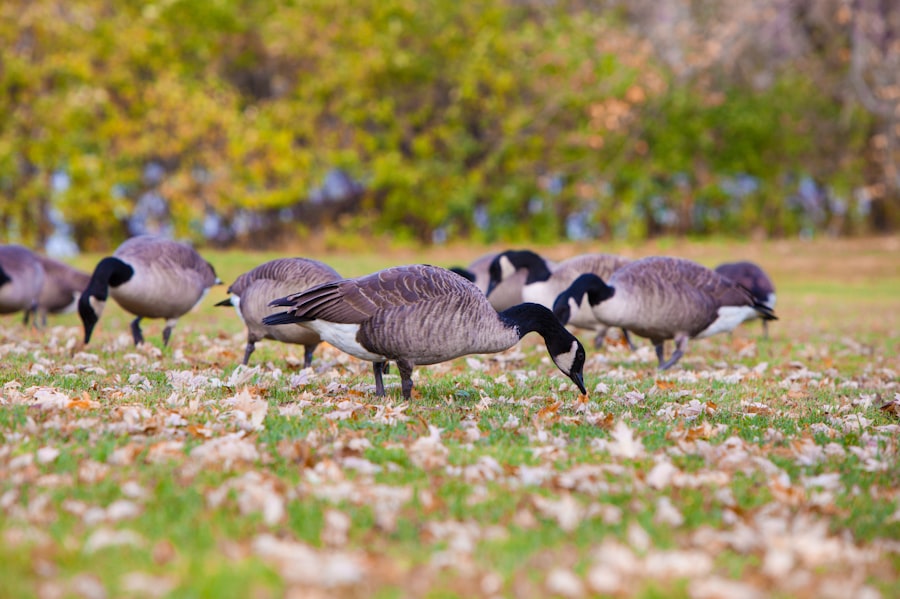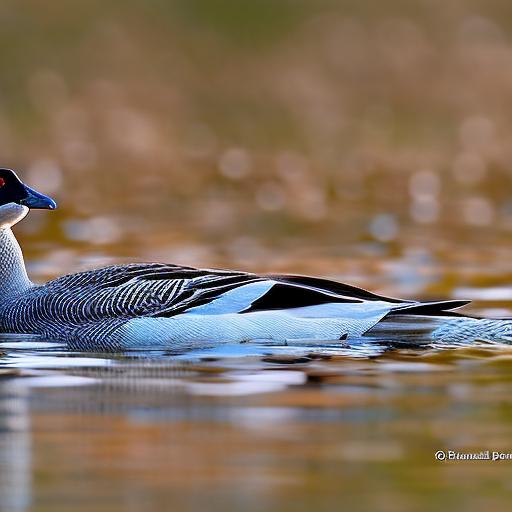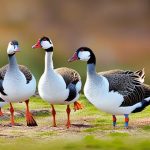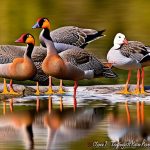Geese have a long history in Australia, dating back to the early days of European settlement. They were brought to the country by early explorers and settlers for their meat, eggs, and feathers. Over time, geese have become a popular choice for backyard farmers and homesteaders due to their many benefits.
There are several reasons why people choose to keep geese. Firstly, geese are excellent natural lawn mowers. They have a voracious appetite for grass and can help keep your lawn neatly trimmed. Additionally, geese are known for their pest control abilities. They can help control populations of insects, slugs, and snails, reducing the need for chemical pesticides.
Furthermore, geese provide a source of fresh eggs and meat. Their eggs are larger than chicken eggs and have a rich flavor. Geese meat is also highly prized for its tenderness and flavor. Lastly, geese can be great companions. They are social animals that can form strong bonds with their owners and other animals on the property.
Key Takeaways
- Keeping geese in Australia is a popular hobby and can be a rewarding experience.
- Geese can provide benefits such as pest control, lawn maintenance, and a source of eggs and meat.
- Choosing the right breed of geese is important for their temperament, size, and egg-laying abilities.
- Geese require adequate housing and shelter to protect them from predators and harsh weather conditions.
- A balanced diet and proper nutrition are essential for the health and well-being of geese.
The benefits of keeping geese in your backyard
One of the main benefits of keeping geese in your backyard is their ability to act as natural lawn mowers. Geese have a strong grazing instinct and will happily munch on grass all day long. This can save you time and effort in mowing your lawn, as the geese will keep it neatly trimmed. They can also help control weeds by eating them before they have a chance to spread.
In addition to being natural lawn mowers, geese are also excellent pest controllers. They have a keen eye for spotting insects, slugs, and snails, which they will eagerly devour. This can help reduce populations of pests in your garden without the need for chemical pesticides. Geese are particularly effective at controlling pests in vegetable gardens and orchards.
Another benefit of keeping geese is the production of eggs and meat. Geese eggs are larger than chicken eggs and have a rich, flavorful yolk. They can be used in a variety of recipes, from omelettes to baked goods. Geese meat is also highly prized for its tenderness and flavor. It is often compared to duck or lamb in taste and texture.
Lastly, geese can provide companionship. They are social animals that can form strong bonds with their owners and other animals on the property. Geese are known for their loyalty and will often follow their owners around like a faithful dog. They can also be protective of their owners and property, making them excellent guard animals.
Choosing the right breed of geese for your needs
There are several popular breeds of geese in Australia that are well-suited for backyard farming. The most common breeds include Toulouse, Embden, Chinese, and African geese. Each breed has its own unique characteristics and suitability for different purposes.
When choosing a breed of geese, there are several factors to consider. Firstly, you should consider the size of the breed. Some breeds, like Toulouse and Embden geese, are larger and heavier, while others, like Chinese and African geese, are smaller and lighter. The size of the breed will determine how much space they require and how much food they will consume.
Another factor to consider is the temperament of the breed. Some breeds, like Toulouse geese, are known for being calm and docile, while others, like African geese, can be more aggressive and territorial. The temperament of the breed will determine how well they will interact with other animals on your property and how easy they will be to handle.
Lastly, you should consider the purpose for which you are keeping geese. If you are primarily interested in egg production, then breeds like Chinese or African geese may be more suitable, as they are known for their prolific egg-laying abilities. If you are interested in meat production, then larger breeds like Toulouse or Embden geese may be a better choice.
Housing and shelter requirements for geese
Geese require adequate housing and shelter to keep them safe and comfortable. There are several types of housing options available for geese, including sheds, coops, and pens. The type of housing you choose will depend on the number of geese you have and the space available on your property.
The size and space requirements for geese housing will depend on the breed and number of geese you have. As a general rule, each adult goose should have at least 10 square feet of space in their housing area. This will allow them to move around comfortably and engage in natural behaviors like preening and stretching their wings.
Bedding and nesting materials are also important considerations when it comes to geese housing. Geese require a soft, dry surface to rest on, so providing them with straw or wood shavings can help keep them comfortable. Additionally, geese will need nesting materials if you plan on breeding them. This can include straw or hay for them to build their nests.
Feeding and nutrition for healthy geese
Feeding geese a balanced diet is essential for their health and well-being. There are several types of feed available for geese, including commercial pellets, grains, and fresh greens. It is important to provide a variety of foods to ensure that geese receive all the necessary nutrients.
Commercial pellets are a convenient option for feeding geese, as they are formulated to provide all the necessary nutrients in a balanced ratio. They can be easily purchased from feed stores or online. Grains like corn, wheat, and barley can also be fed to geese as a source of carbohydrates.
Fresh greens are an important part of a goose’s diet, as they provide essential vitamins and minerals. Geese can be fed a variety of greens, including lettuce, spinach, kale, and dandelion greens. It is important to introduce new foods gradually to avoid digestive upset.
Feeding geese should be done on a regular schedule to ensure that they receive enough food. Adult geese should be fed twice a day, in the morning and evening. It is important to provide enough food for all the geese in the flock, as competition for food can lead to aggression and bullying.
Health and disease prevention for geese

Keeping geese healthy requires regular monitoring and preventative measures. There are several common health issues that can affect geese, including respiratory infections, parasites, and foot problems. It is important to be aware of the signs of illness and take appropriate action if necessary.
Preventative measures can help reduce the risk of disease in geese. This includes providing clean housing and bedding, regular cleaning of water containers, and maintaining good hygiene practices. It is also important to provide a balanced diet and ensure that geese have access to fresh water at all times.
Signs of illness in geese can include lethargy, loss of appetite, difficulty breathing, diarrhea, or changes in behavior. If you notice any of these signs in your geese, it is important to seek veterinary advice as soon as possible. Early intervention can help prevent the spread of disease and improve the chances of recovery.
Breeding and reproduction of geese
Breeding geese can be a rewarding experience, but it requires careful planning and preparation. Geese are monogamous animals that mate for life. They will typically form pairs during their first year and remain together for the rest of their lives.
The mating habits of geese involve courtship displays and rituals. The male goose will often perform elaborate displays to attract a female mate. Once a pair has formed, they will engage in mating behavior, which involves the male mounting the female and copulating.
After mating, the female goose will lay a clutch of eggs. The number of eggs laid will depend on the breed and individual goose. The eggs will need to be incubated for a period of around 28-35 days, depending on the breed. During this time, it is important to provide a warm and stable environment for the eggs.
Once the goslings hatch, they will need to be cared for and protected by their parents. The goslings will require a diet of starter feed and fresh water. They should also be provided with a safe and secure area to explore and grow. It is important to monitor the health and development of the goslings closely during this time.
Training and handling geese for better behavior
Training and handling geese can help improve their behavior and make them easier to manage. Geese are intelligent animals that can learn basic commands and routines. By using positive reinforcement techniques, you can build trust and establish a bond with your geese.
Basic training techniques for geese include teaching them to come when called, walk on a leash, and respond to simple commands like “sit” or “stay”. Training sessions should be short and frequent, with plenty of rewards for good behavior. It is important to be patient and consistent when training geese.
Handling geese can be challenging, especially if they are not used to being handled. It is important to approach geese calmly and confidently, using slow movements. It can be helpful to offer treats or rewards when handling geese, as this can help build trust and make the experience more positive.
Building trust with your geese is an important part of training and handling. Spending time with your geese, talking to them, and offering treats can help establish a bond. It is important to be gentle and patient with your geese, as they can be sensitive animals.
Geese as pest control and natural lawn mowers
Geese can be highly effective at controlling pests and maintaining lawns and gardens. Their grazing habits make them excellent natural lawn mowers, as they will happily munch on grass all day long. This can save you time and effort in mowing your lawn, as the geese will keep it neatly trimmed.
In addition to being natural lawn mowers, geese are also excellent pest controllers. They have a keen eye for spotting insects, slugs, and snails, which they will eagerly devour. This can help reduce populations of pests in your garden without the need for chemical pesticides.
Geese are particularly effective at controlling pests in vegetable gardens and orchards. They can help keep pests like aphids, caterpillars, and beetles under control, reducing the need for chemical interventions. Geese can also help control weeds by eating them before they have a chance to spread.
Legal considerations for keeping geese in Australia
Before keeping geese in Australia, it is important to be aware of the legal considerations and requirements. Regulations and permits may vary depending on the state or territory you live in. It is important to check with your local council or agricultural department to ensure that you are complying with the law.
In some areas, a permit may be required to keep geese. This is to ensure that geese are being kept in appropriate conditions and are not causing a nuisance to neighbors or the environment. Permits may have specific requirements regarding housing, space, and care of geese.
Local laws and ordinances may also apply to keeping geese. These laws may cover issues such as noise, waste management, and property boundaries. It is important to familiarize yourself with these laws and ensure that you are meeting all requirements.
As a goose owner, you have certain responsibilities towards your geese. This includes providing adequate housing, food, and water, as well as ensuring their health and well-being. It is important to be a responsible owner and take proper care of your geese.
In conclusion, keeping geese in Australia can be a rewarding and enjoyable experience. By following these guidelines, you can ensure that your geese are healthy, happy, and well-cared for. Whether you’re looking for companionship, pest control, or fresh eggs and meat, geese can provide a variety of benefits for backyard farmers and homesteaders alike.
If you’re interested in keeping geese in Australia, you may also want to check out this informative article on Poultry Wizard about what vegetables quails eat. Quails are another popular poultry option, and understanding their dietary needs can help you provide a well-rounded and nutritious diet for your geese as well. To learn more about what vegetables quails eat, click here: https://poultrywizard.com/keeping-quail/what-vegetables-do-quails-eat/.
FAQs
What are geese?
Geese are waterfowl birds that belong to the family Anatidae. They are known for their long necks, webbed feet, and distinctive honking sound.
Why keep geese in Australia?
Geese can be kept in Australia for a variety of reasons, including as pets, for meat production, or for their eggs. They are also useful for weed control and as a natural alarm system.
What are the best breeds of geese to keep in Australia?
The best breeds of geese to keep in Australia depend on the purpose for which they are being kept. Some popular breeds include Embden, Toulouse, and Chinese geese.
What do geese eat?
Geese are omnivores and eat a variety of foods, including grass, grains, insects, and small animals. They also require access to clean water for drinking and bathing.
How do you care for geese?
Caring for geese involves providing them with adequate food, water, and shelter. They also require regular veterinary care and protection from predators. Geese should be kept in a secure enclosure with access to a pond or other water source.
Are geese noisy?
Geese are known for their loud honking calls, which can be heard from a distance. However, some breeds are quieter than others, and proper training can help reduce excessive noise.
Can geese fly?
Geese are capable of flight, but some breeds are better fliers than others. Domesticated geese may have their wings clipped to prevent them from flying away.
Are geese aggressive?
Geese can be territorial and may become aggressive if they feel threatened or if their nesting area is disturbed. However, proper handling and socialization can help prevent aggressive behavior.
Meet Walter, the feathered-friend fanatic of Florida! Nestled in the sunshine state, Walter struts through life with his feathered companions, clucking his way to happiness. With a coop that’s fancier than a five-star hotel, he’s the Don Juan of the chicken world. When he’s not teaching his hens to do the cha-cha, you’ll find him in a heated debate with his prized rooster, Sir Clucks-a-Lot. Walter’s poultry passion is no yolk; he’s the sunny-side-up guy you never knew you needed in your flock of friends!







